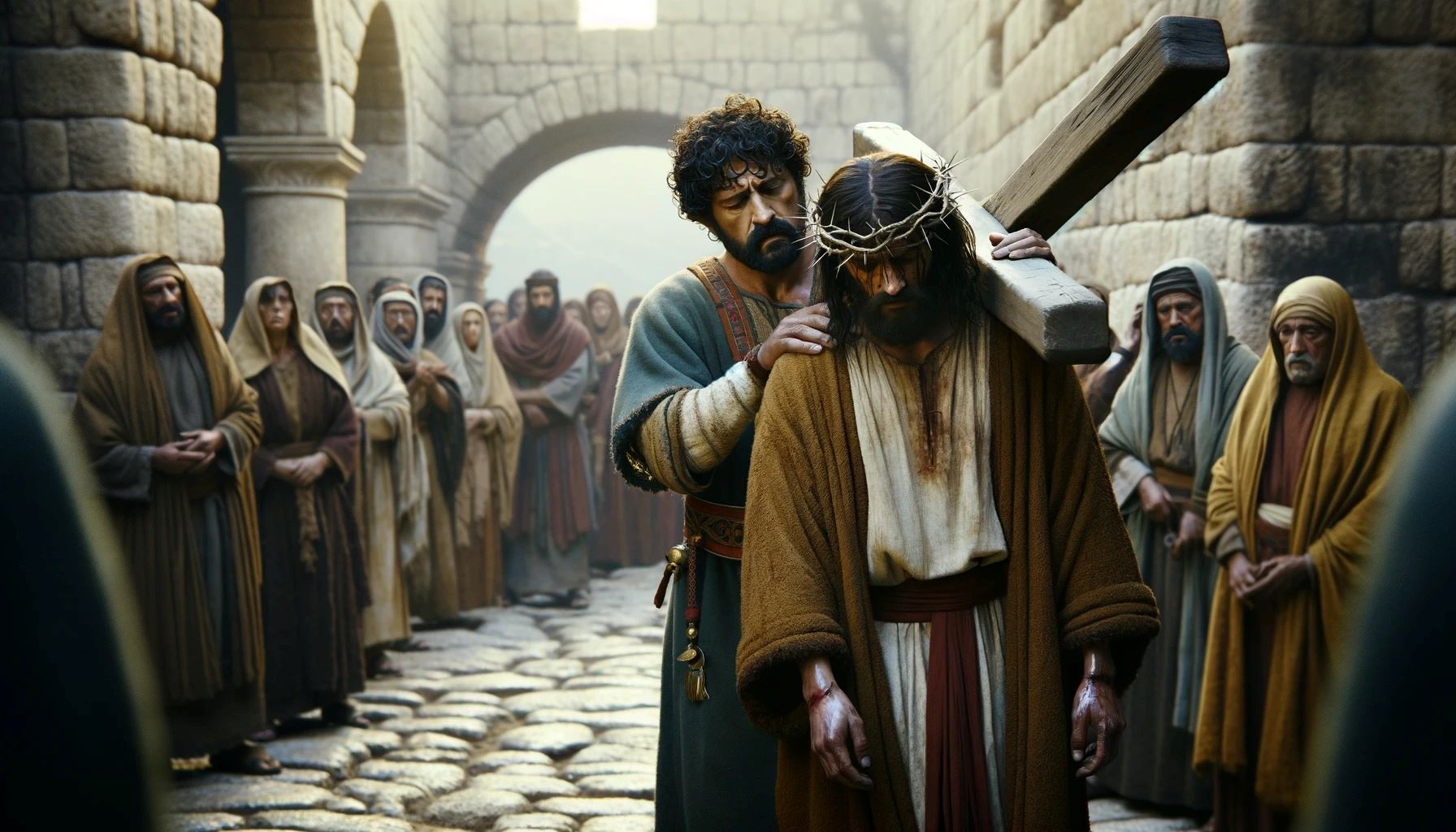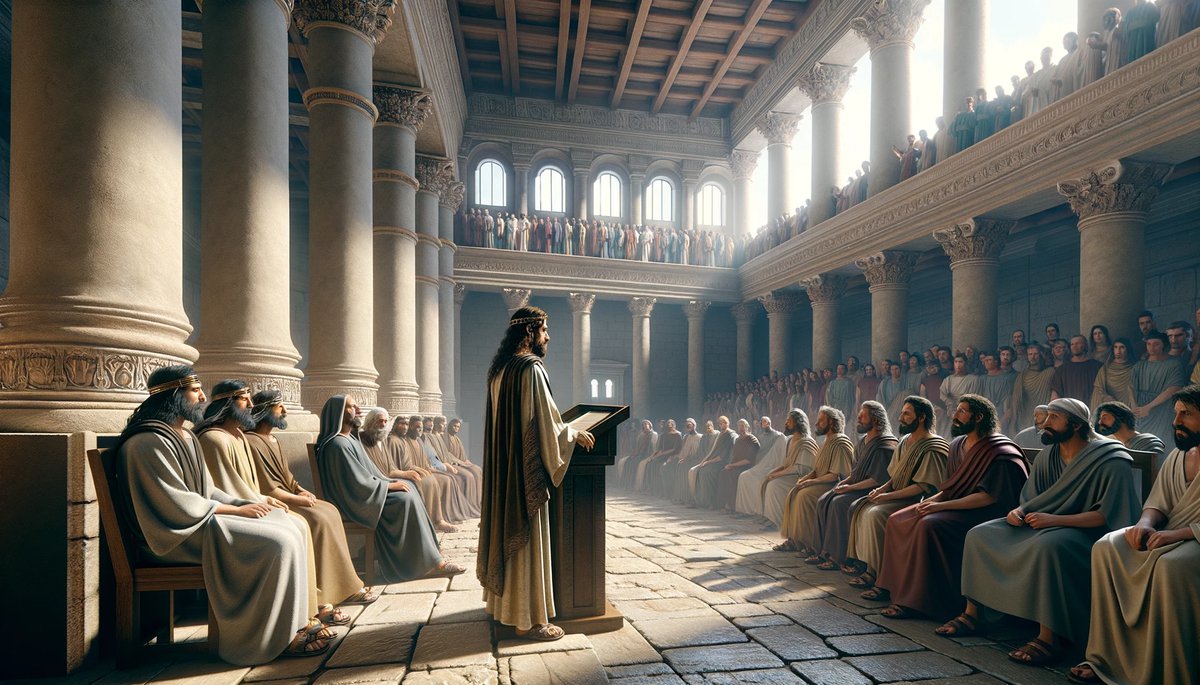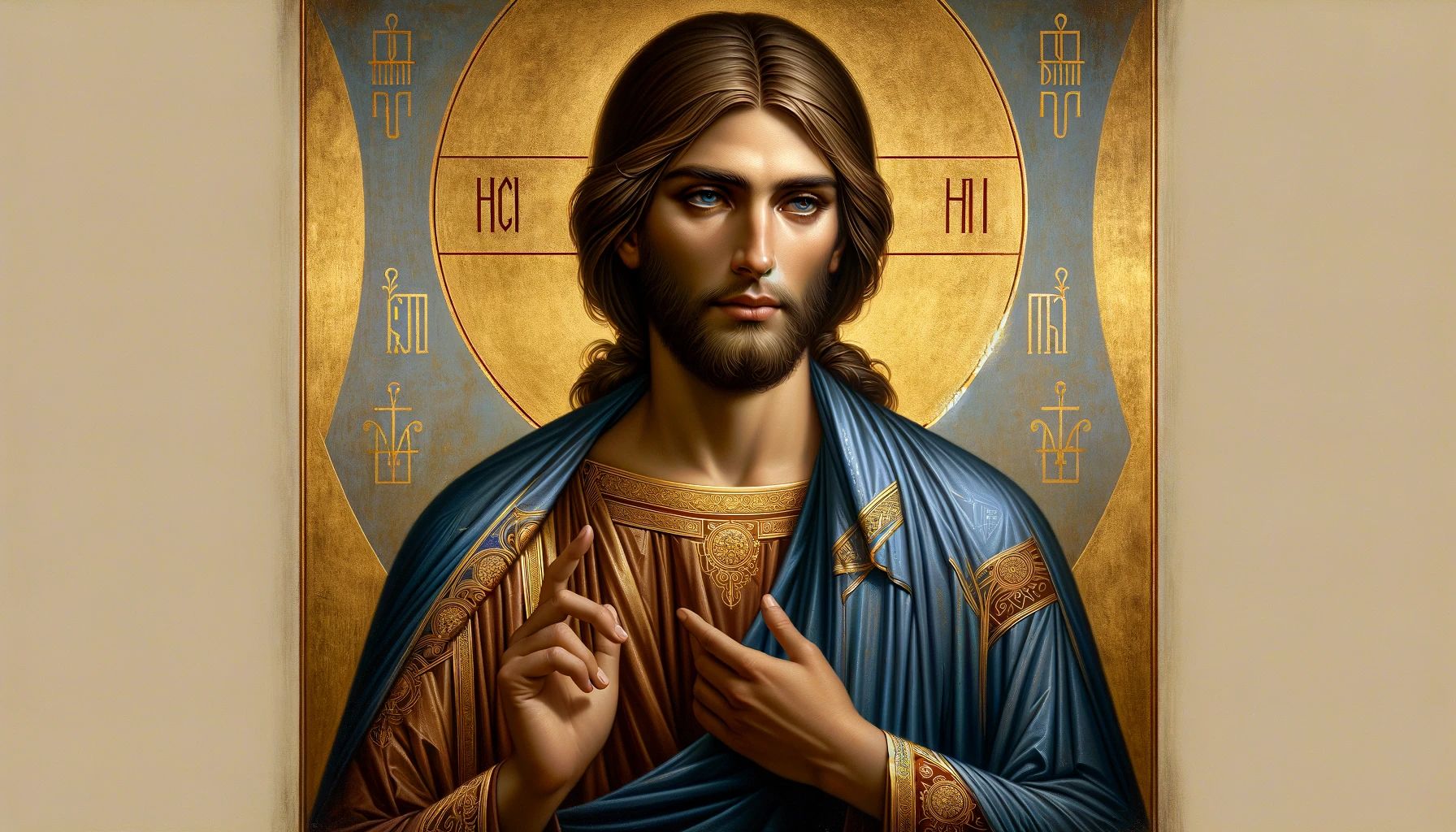Home>Christian Videos>Bible Stories>What Is The Meaning Of Cross Of Jesus Christ


Bible Stories
What Is The Meaning Of Cross Of Jesus Christ
Published: March 2, 2024
Peter Smith, Editorial Director at Christian.net, combines deep insights into faith, politics, and culture to lead content creation that resonates widely. Awarded for his contributions to religious discourse, he previously headed a major organization for religious communicators, enhancing dialogue on faith's societal impacts.
Discover the profound significance of the cross of Jesus Christ and its relevance in Bible stories. Uncover the true meaning and impact of this pivotal symbol.
(Many of the links in this article redirect to a specific reviewed product. Your purchase of these products through affiliate links helps to generate commission for Christian.net, at no extra cost. Learn more)
Table of Contents
Introduction
What is the meaning of the cross of Jesus Christ? This question has intrigued theologians, scholars, and believers for centuries. The cross is a powerful symbol in Christianity, representing the central event of Jesus Christ's crucifixion and subsequent resurrection. It holds deep significance and symbolism for Christians around the world, and its meaning goes beyond a mere historical event. In this article, we will explore the historical context, symbolism, and significance of the cross in Christianity, as well as its impact on believers.
The Historical Context of the Cross
The historical context of the cross of Jesus Christ is rooted in the events of the 1st century AD in the Roman province of Judea. Crucifixion was a common form of execution in the Roman Empire, reserved for the most despised criminals and rebels. Jesus Christ, a Jewish preacher and religious leader, was crucified by the Roman authorities at the instigation of the Jewish religious leaders. This event took place during the rule of Pontius Pilate, the Roman governor of Judea. The crucifixion of Jesus was a pivotal moment in history, marking the climax of his earthly ministry and the fulfillment of the divine plan for the redemption of humanity.
The crucifixion of Jesus is recorded in the New Testament Gospels of Matthew, Mark, Luke, and John, providing historical accounts of the events leading up to the crucifixion, the crucifixion itself, and the subsequent resurrection. These accounts serve as primary sources for understanding the historical context of the cross and its significance in the life and teachings of Jesus Christ.
The crucifixion of Jesus was a brutal and humiliating form of execution, designed to inflict maximum pain and shame on the condemned. Jesus endured unimaginable suffering on the cross, bearing the weight of humanity's sins according to Christian belief. Despite the cruelty and injustice of his crucifixion, Christians believe that Jesus willingly sacrificed himself for the salvation of humanity, demonstrating the depth of God's love and mercy.
The historical context of the cross extends beyond the physical act of crucifixion to encompass the theological and spiritual implications of Jesus' sacrificial death. It serves as a reminder of the suffering and sacrifice endured by Jesus for the sake of humanity, and it forms the foundation of Christian faith and redemption. The historical reality of the cross is inseparable from its spiritual and theological significance, shaping the beliefs and practices of Christians throughout history.
The Symbolism of the Cross
The cross holds profound symbolism in Christianity, representing the core tenets of the faith and serving as a potent reminder of Jesus Christ's sacrifice and victory over sin and death. Here are some key aspects of the symbolism of the cross:
1. Redemption and Salvation
The cross symbolizes the means by which Christians believe humanity is redeemed and reconciled with God. According to Christian doctrine, Jesus' crucifixion on the cross served as the ultimate atonement for the sins of humanity, offering the promise of salvation and eternal life to those who believe in him.
2. Sacrificial Love
The cross embodies the concept of sacrificial love, illustrating Jesus' selfless and unconditional devotion to humanity. By willingly enduring the agony of crucifixion, Christians believe that Jesus demonstrated the depth of God's love for all people, regardless of their shortcomings or failings.
Read more: How To Interpret Jesus Christ’s Cross
3. Victory Over Death
The cross represents the triumph of life over death, as Christians believe that Jesus' resurrection following his crucifixion signifies the defeat of sin and the promise of eternal life. The empty cross, devoid of Jesus' body, serves as a powerful symbol of hope and new beginnings, inspiring believers to embrace the promise of spiritual renewal and transformation.
4. Forgiveness and Reconciliation
Through the symbolism of the cross, Christians are reminded of the profound forgiveness and reconciliation offered by God through the sacrifice of Jesus. The cross serves as a tangible expression of God's mercy and grace, inviting believers to seek forgiveness and extend compassion to others in their own lives.
5. Uniting Believers
The cross is a unifying symbol for Christians worldwide, transcending cultural and denominational boundaries. It serves as a unifying emblem of faith, reminding believers of their shared identity as followers of Christ and their commitment to embodying his teachings in their daily lives.
6. Moral and Spiritual Guidance
The cross symbolizes the moral and spiritual guidance provided by Jesus' teachings, inspiring believers to live lives of compassion, humility, and service to others. It serves as a constant reminder of the ethical principles and values upheld by the Christian faith, guiding believers in their interactions with the world around them.
In summary, the symbolism of the cross in Christianity encompasses themes of redemption, sacrificial love, victory over death, forgiveness, unity, and moral guidance. It serves as a potent and multifaceted symbol that resonates deeply with believers, shaping their faith, values, and worldview.
Read more: What Does It Mean To Abide In Jesus Christ
The Significance of the Cross in Christianity
The significance of the cross in Christianity is profound and multifaceted, permeating every aspect of the faith and the lives of believers. Here are the key elements that illustrate the significance of the cross:
-
Atonement and Redemption: The cross is central to the Christian belief in atonement and redemption. According to Christian doctrine, Jesus' sacrificial death on the cross served as the ultimate atonement for the sins of humanity, offering the promise of salvation and eternal life to those who believe in him. The significance of the cross lies in its role as the instrument through which God's redemptive plan for humanity was fulfilled, providing a pathway for reconciliation with God and the restoration of the divine-human relationship.
-
Foundation of Christian Faith: The cross serves as the foundation of Christian faith, shaping the beliefs, practices, and theological framework of the religion. It represents the core message of the Gospel – the good news of Jesus' life, death, and resurrection – and forms the basis of Christian identity and spirituality. The significance of the cross is evident in its role as the defining symbol of Christianity, uniting believers around the world in their shared faith and devotion to Christ.
-
Exemplar of Love and Sacrifice: The cross stands as the ultimate exemplar of love and sacrifice in Christian theology. Jesus' willingness to endure the agony of crucifixion out of love for humanity serves as a powerful demonstration of selfless devotion and compassion. The significance of the cross lies in its portrayal of divine love in action, inspiring believers to emulate Jesus' example by showing love, compassion, and self-sacrifice in their relationships and interactions with others.
-
Victory Over Sin and Death: The cross symbolizes the victory of Jesus Christ over sin and death, offering hope and assurance to believers. Through his crucifixion and subsequent resurrection, Christians believe that Jesus conquered the powers of darkness and offered the promise of eternal life to all who place their trust in him. The significance of the cross lies in its role as the emblem of triumph and new life, providing believers with the assurance of spiritual renewal and the defeat of the forces of evil.
-
Source of Healing and Wholeness: The cross holds significance as a source of healing and wholeness in Christian spirituality. It represents the divine remedy for the brokenness and woundedness of humanity, offering the promise of spiritual, emotional, and relational restoration. The significance of the cross lies in its capacity to bring healing and reconciliation, inviting believers to seek forgiveness, inner healing, and the restoration of their relationship with God and others.
In summary, the significance of the cross in Christianity encompasses its role in atonement and redemption, as the foundation of Christian faith, as an exemplar of love and sacrifice, as the symbol of victory over sin and death, and as a source of healing and wholeness. Its profound significance permeates the core of Christian belief and practice, shaping the identity, spirituality, and mission of believers throughout history.
The Impact of the Cross on Believers
The impact of the cross on believers is profound and far-reaching, shaping their faith, spirituality, and daily lives in significant ways. Here are the key aspects that illustrate the impact of the cross on believers:
-
Transformation of Perspective: The cross serves as a powerful symbol that transforms the perspective of believers, reminding them of the depth of God's love and the extent of Jesus' sacrifice. It inspires believers to view their own lives and the world around them through the lens of sacrificial love and redemption, fostering a sense of gratitude, humility, and compassion.
-
Renewed Identity and Purpose: For believers, the cross represents a source of renewed identity and purpose, serving as a constant reminder of their connection to the redemptive work of Jesus Christ. It empowers them to embrace their identity as forgiven and beloved children of God, motivating them to live lives of purpose, service, and moral integrity.
-
Empowerment for Overcoming Adversity: The cross provides believers with a source of empowerment and strength in the face of adversity and challenges. It serves as a symbol of hope and resilience, reminding believers that they can draw upon the power of Jesus' sacrifice to overcome obstacles, endure suffering, and find meaning in the midst of trials.
-
Guidance for Moral and Ethical Living: The cross offers believers guidance for moral and ethical living, inspiring them to embody the values of love, forgiveness, and selflessness exemplified by Jesus. It serves as a moral compass, directing believers to act with integrity, compassion, and justice in their interactions with others and the world at large.
-
Community and Fellowship: The cross fosters a sense of community and fellowship among believers, uniting them in their shared faith and devotion to Jesus Christ. It serves as a unifying symbol that transcends cultural, racial, and social barriers, creating a sense of belonging and solidarity among diverse groups of believers.
-
Source of Comfort and Healing: The cross provides believers with a source of comfort and healing in times of sorrow, pain, and loss. It serves as a reminder of God's presence in the midst of suffering, offering believers the assurance of divine compassion and the promise of ultimate restoration and wholeness.
In summary, the impact of the cross on believers encompasses the transformation of perspective, renewed identity and purpose, empowerment for overcoming adversity, guidance for moral and ethical living, community and fellowship, and a source of comfort and healing. Its influence extends to every dimension of believers' lives, shaping their worldview, values, relationships, and spiritual journey.
Conclusion
In conclusion, the cross of Jesus Christ holds profound significance and symbolism in Christianity, rooted in its historical context, theological implications, and impact on believers. It represents the central event of Jesus' crucifixion and subsequent resurrection, serving as a potent reminder of God's redemptive love and the promise of salvation for humanity. The symbolism of the cross encompasses themes of redemption, sacrificial love, victory over death, forgiveness, unity, and moral guidance, resonating deeply with believers and shaping their faith and spirituality. The significance of the cross lies in its role as the foundation of Christian faith, the exemplar of love and sacrifice, the symbol of victory over sin and death, and a source of healing and wholeness. Its impact on believers extends to their perspective, identity, resilience, moral living, community, and source of comfort and healing. The cross stands as a timeless and universal symbol of hope, love, and transformation, inspiring believers to embody the teachings and example of Jesus Christ in their daily lives.













